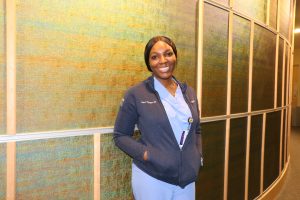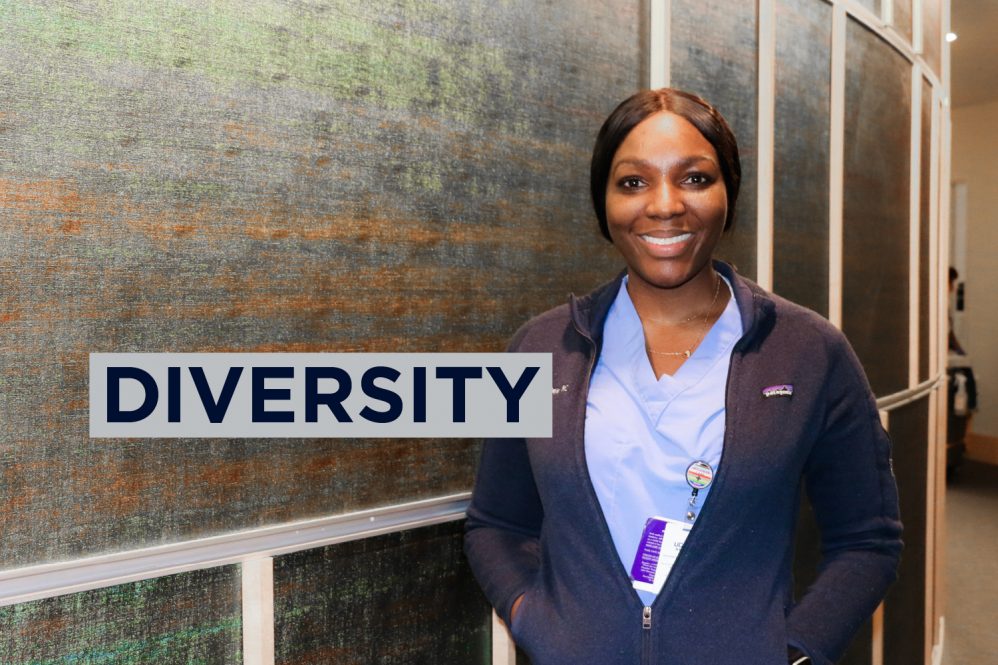Dr. Chioma Ogbejesi, 32, of West Haven, Conn. has taken a unique and diverse path into medicine. Not only is she proudly a Black woman among the underrepresented in medicine (URim), training to be an OB/GYN surgeon at UConn School of Medicine, but she is also a proud former nurse.
In fact, Ogbejesi graduated from UConn School of Nursing. And after several years working as a nurse, she chose to enter medical school to become a physician. She is currently a third-year resident at UConn School of Medicine spending long days training in the operating room and caring for OB/GYN patients of all ages.

“I love the mixture of women’s health care needs and continuity of care I can provide to my patients from helping patients to get pregnant to their surgery needs. OB/GYN surgery is a very fulfilling field,” she says.
Also, a unique, new and growing program at UConn School of Medicine has helped Ogbejesi accomplish her medical career path goals.
During Ogbejesi’s fourth year of medical school at Central Michigan University, she applied to the UConn School of Medicine’s Visiting Externships for Students Underrepresented in Medicine (VESUM) program. It offers visiting medical students from around the country the opportunity to participate in fourth-year electives at UConn Health for four-week sessions across primary care or specialty care areas.
The VESUM program gave Ogbejesi the opportunity to rotate for four weeks through the School of Medicine’s Department of OB/GYN programs. It gifted Ogbejesi with an invaluable insider’s view of the field of OB/GYN and the institution of UConn to see what it’s really like before choosing her residency program match.
UConn was once again a perfect fit for the former UConn-trained nurse and this future OB/GYN surgeon.
“It was a total win for me,” says Ogbejesi. “The VESUM program experience was great. Mentorship is so critical, especially early on in your medical career. I definitely highly encourage others to participate in the VESUM externship program to see how good UConn residency programs are in the field you wish to apply to. The externship gave me a higher comfort level including about my residency placement choice and the opportunity to have face-to-face interactions with other UConn residents and faculty that I may not have had.”
“Chioma is a successful OB/GYN resident entering her last year of training with us at UConn School of Medicine,” says the VESUM program’s director Dr. Linda Barry. “She was the first VESUM student to match at UConn. Her trajectory of a successful match after participating in our program as a medical student to preparing to practice OB/GYN in the community is a testament to her accomplishments and the importance of such programs.”
As a mentor Barry and her VESUM program are making a big difference in the lives of talented trainees like Ogbejesi and graduate medical education.
Ogbejesi credits her UConn OB/GYN residency success to the great mentorship and guidance she received from Barry and her VESUM program to always put her best foot forward.
“Medicine is not as diverse as it should be,” shares Ogbejesi. “Being a person of color in medicine you can experience certain challenges. It was incredibly helpful to me to have mentors like Dr. Barry help me navigate any challenges I may have faced.”
Barry, associate professor of surgery at the School of Medicine, is also interim associate dean of the Office of Multicultural and Community Affairs and interim director of the UConn Health Disparities Institute.
Ogbejesi’s inspiring UConn experience is one of the strong examples of the powerful work of UConn School of Medicine leaders and mentors.



